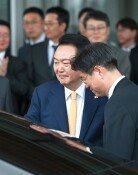Leaders on the road
Leaders on the road
Posted September. 21, 2019 07:29,
Updated September. 21, 2019 07:29
A series of major events that are called “the first since the 2008 global financial crisis” have happened in and outside the U.S. in recent months. A swarm of drones attacked oil plants in Saudi Arabia on September 14, the oil price surged nearly 20 percent for two days, the largest one-day percentage gain since December 2008. Who would have expected that about 5 percent of the global oil supply would be wiped out overnight due to a drone attack? The world is faced with other tough issues as well, including U.S.-China trade war, anti-China demonstrations in Hong Kong, and the UK leaving the European Union (EU).
The U.S. practically served as global police in the past, intervening in conflicts around the world. But now it is reluctant to take military action in the Middle East, saying it does not need crude oil and gas from the region since it is the world’s largest energy producer. U.S. President Donald Trump, who detests the idea of U.S. military intervention in the Middle East and overseas basing of U.S. military forces due to cost issues, bluntly complained about the U.S. playing an active security role in the Middle East. A unfamiliar shadow of a “world without the U.S.” loomed over the world.
The situation is not different in the U.S. The country’s largest automaker General Motors (GM) faced the first strike since 2007. The global auto market, which enjoyed a resurgence after the 2008 global financial crisis, is experiencing slow sales, deteriorating labor-management relations at GM. GM had announced that it would close four U.S. factories in order to deal with market slowdown and survive technological changes, such as electric vehicles.
The strike at GM represents a slowdown in the global manufacturing sector. The August Purchasing Managers’ Index (PMI), which shows the trend in the automotive industry, dropped to its lowest since September, 2009. The global manufacturing industry is shrinking to the level of previous crises, according to the Center for International Finance. It warned that the prospect of an economic recession and the anxiety in the financial sector could increase if the global service industry, which is propping up the global economy, deteriorates as well.
The Federal Reserve (Fed) has cut its benchmark interest rate for 18 days in a row since cutting it in more than a decade in July. This is the second “vaccine shot” aimed at preventing another economic recession. Not fully satisfied with the decision, President Trump is calling for a big cut, supporting negative interest rates. Pushing interest rates down into negative territory is the path the U.S. has never taken so far. Concerns are rising within the Fed that the central bank would run out of ammunition in actual economic recession once rates go below zero. The Fed slashed rates by five full percentage points to zero in response to recession eleven years ago, meaning it had sufficient room to implement monetary policy. The current rates stand at 1.75-2.00 percent, leaving less room for rate cuts.
Warning signs flickering here and there do not necessarily lead to a global economic recession or a geopolitical crisis. But it is evident that leaders of countries around the world will have to get through difficulties that no one has ever experienced in this complex crisis, where economic, security, and geopolitical crises are intertwined.
South Korea is highly dependent on the U.S. when it comes to security and the third highest importer of crude oil in Asia followed by China and Japan. Since South Korea is a small-scale open economy, which accumulated its wealth through free trade, it could catch pneumonia when other countries get a cold. Therefore, it should have a more solid crisis management system than any other countries in the world so that it can analyze the cause of crisis and respond quickly.
How could we trust our diplomatic and national security leaders if they are busy fighting a war of nerves, reportedly arguing in English? If they were to lead the people to the road never taken, they should unite forces first.
Yong Park parky@donga.com







